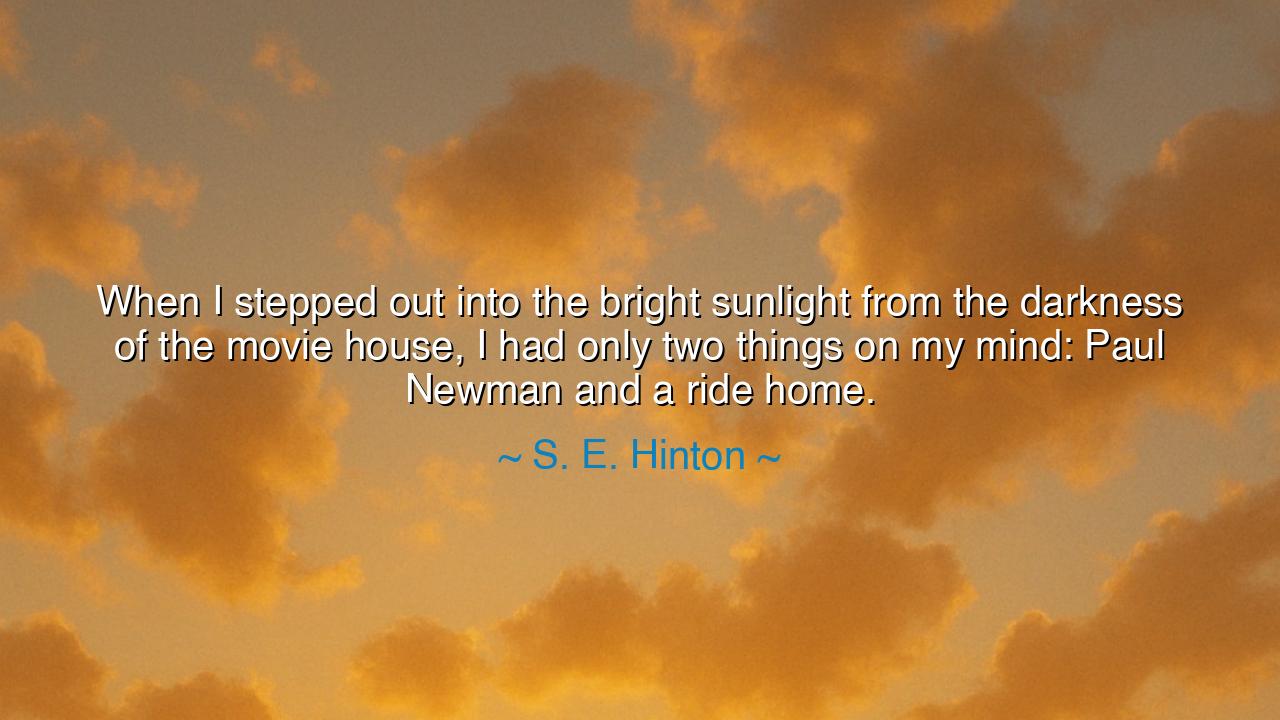
When I stepped out into the bright sunlight from the darkness of
When I stepped out into the bright sunlight from the darkness of the movie house, I had only two things on my mind: Paul Newman and a ride home.






The words of S. E. Hinton, “When I stepped out into the bright sunlight from the darkness of the movie house, I had only two things on my mind: Paul Newman and a ride home,” open one of the most iconic novels of youth — The Outsiders. Yet beyond their simplicity lies a world of meaning, a reflection of the eternal struggle between innocence and experience, illusion and truth, shadow and light. In the rhythm of that sentence, we hear the first breath of awakening — the moment when one leaves behind the dream and faces the brightness of the real world. This quote, though rooted in the language of a young boy from the 1960s, speaks like a parable from the ancients: a soul stepping from the darkness of illusion into the light of understanding.
The darkness of the movie house is not merely the shadowed theater where stories unfold upon the silver screen; it is the shelter of youth itself — the realm of dreams, where one is safe from consequence and free to imagine being someone else. Within that darkness, Ponyboy Curtis, the story’s narrator, can forget who he is — a poor boy, a “Greaser” scorned by society — and lose himself in the heroic faces of actors like Paul Newman, whose courage, coolness, and beauty seem untouched by the hardships of real life. But when the movie ends and the light floods in, the illusion dissolves. The brightness of the sunlight is not comforting — it is harsh, revealing, and real. It marks the crossing from fantasy to truth, from the dream of what could be to the awareness of what is.
This moment mirrors the ancient transitions of myth — like Plato’s Allegory of the Cave, where the prisoner, long confined to shadows, steps into the sunlight and is blinded by truth. The movie house is the cave, and the sunlight the real world waiting to test the spirit. Ponyboy, stepping out into that glare, becomes every young soul on the threshold of adulthood — every heart forced to exchange the safety of dreams for the clarity of experience. The bright sunlight burns, but it also reveals. It is through discomfort that truth enters the heart.
And what of Paul Newman? In that name lies a symbol — not merely the actor, but the ideal: beauty, fame, perfection, and control. For the young and the dreaming, Paul Newman represents all that is untouchable, the kind of man the world admires but few become. The thought of him lingers in Ponyboy’s mind because he embodies the contrast between the life on the screen and the life outside — the glamour of fiction versus the struggle of reality. To admire such figures is human; to recognize that one must still walk one’s own road home is wisdom.
This, then, is the true power of the line’s final phrase: “a ride home.” After the dream fades, after the glow of the movie, the heart seeks its way back to what is real — to home, to belonging, to truth. Yet the journey home is never easy. It is the road of self-understanding, often lonely and uncertain. In that moment, Ponyboy does not know that the days ahead will shatter his innocence, teach him pain, loss, and courage. But in stepping from the darkness into the light, he begins that journey. Thus, this simple sentence becomes the threshold of transformation — the moment before the soul’s awakening.
Consider, too, how many through history have lived such a passage. The young Prince Siddhartha, before becoming the Buddha, stepped outside the sheltered walls of his palace and saw, for the first time, the suffering of the world — age, sickness, death. Like Ponyboy, he left the darkness of illusion for the light of truth, and though that light was painful, it became his path to enlightenment. Every human life must walk this same crossing, from the imagined to the real, from the story we tell ourselves to the truth we must live.
The lesson, then, is timeless: cherish your dreams, but do not mistake them for life. Let the light reveal what is real, even when it hurts. Step bravely from comfort into clarity. The world beyond the movie house — the bright, raw, dazzling world — is where we grow, where we learn to love and to lose, to struggle and to belong. Seek not to remain forever in the darkness of escape, nor to hide behind ideals that are not your own. Instead, walk into the sunlight of your own becoming.
And when you do, remember the wisdom hidden in Hinton’s opening line: that to awaken is to leave behind illusion, to see both beauty and pain as one. The sunlight may sting the eyes, but it also warms the heart. And in the end, when the movie fades and the world calls, all that truly matters is the courage to step into the light — and to find, in that journey, your own way home.






AAdministratorAdministrator
Welcome, honored guests. Please leave a comment, we will respond soon